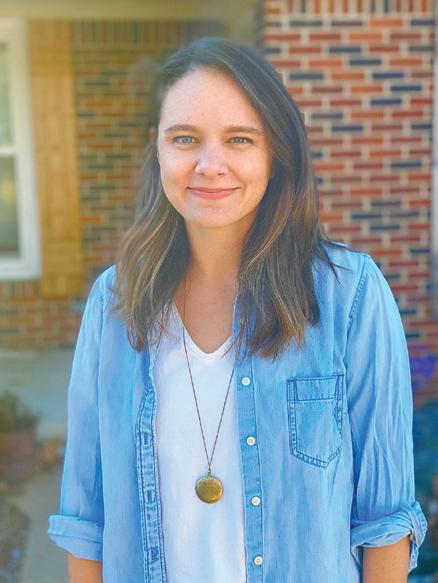
3 minute read
Discovering Interfaith Leadership
“If you believe I am going to hell, the absolute worst place you can imagine, how can we ever be in an authentic relationship together?” she asked, and I curled up tighter into a ball. I was 19 and attending “Coming Together,” the first national summit of interfaith councils, at Princeton University. There, I also met Eboo Patel and learned about his newly-founded Interfaith Youth Core (IFYC). It was 2005, and while I had friends from diverse faith traditions, I was not yet able to recognize just how much Christian privilege I carried. I used my faith as a way for me to identify who was “in” and who was “out.” If I could meet my 19-year old self, I would say, “Be gentle with yourself, dear one, but please also be much gentler with others. Your world is about to get bigger. Kinder. Better.”
Advertisement
That first connection to interfaith collaboration launched me into years of interfaith work.
In college at Texas Christian University in Fort Worth, Texas, I helped launch our campus’s first Interfaith Council. In graduate school, I spent a month in India studying religion and interfaith dialogue. In 2013, my husband and I joined the Peace Corps and moved to Morocco. I quickly learned that 99% of Moroccans are Muslim (I also quickly learned Moroccan Arabic!).
Prior to Morocco, I thought that the best way for me to engage in interfaith work as a member of a majority religion was to make my faith smaller so that others felt more comfortable. In Morocco, my perspective shifted. I was profoundly moved by the love and kindness my Muslim community shared with me because of their faith. They were 100% Muslim, and yet I always felt welcomed just as I was. I recognized that I could be part of interreligious dialogue because of my identity as a Catholic Christian, not in spite of it.
I now serve as a chaplain at TCU, and a major focus of my work is supporting campus-wide interfaith initiatives. My partnerships with IFYC and BJC empower me to do this work better than I could on my own. Each year, I send several students to IFYC’s Interfaith Learning Institute in Chicago. This workshop trains students to be effective interfaith leaders on campus, and these students then serve as interfaith interns for the Office of Religious and Spiritual Life.
This past semester, one intern named Julia connected with a Hindu student over a meal and asked, “What do you need to better practice your faith on campus?” That question turned into the first ever Diwali dinner at TCU. On a Friday evening (a Friday night! on a college campus!), more than 20 Hindu students showed up to eat Indian food and craft a rangoli (a pattern on the floor made of flower petals). Julia and her fellow interns used what they learned from IFYC to create relationships with underrepresented students and work together to meet their needs as people of faith.
As a BJC Fellow, I have the added lens of protecting religious liberty in my work. Every other year, TCU organizes a Tunnel of Oppression, an interactive event that highlights contemporary issues of oppression. It is designed to introduce participants to concepts of oppression, privilege and power. In November, the interfaith interns used resources from BJC to create a room in TCU’s tunnel. They introduced more than 600 students to religious oppression and Christian privilege. I was beaming with pride.
It is a good thing that 19-year-old Britt met other curious, brave and devoutly religious students at that interfaith gathering many moons ago. Those early relationships moved me into a field that I didn’t even know existed.
During this year’s Shurden Lectures, Eboo Patel said that, in the future, being an interfaith leader is going to be a career path. I feel lucky to be on that path already; it is a privilege to shine light on that path for others. Watch out, world: interfaith rock stars are coming your way.
Britt Luby is a 2018 BJC Fellow who serves as Associate Chaplain at TCU in Fort Worth, Texas. Her work focuses on religious literacy and interfaith leadership, grief support for students coping with loss and pastoral care/spiritual development for young adults.

TCU students, including two IFYC-trained interns, attend a Diwali dinner on campus.

